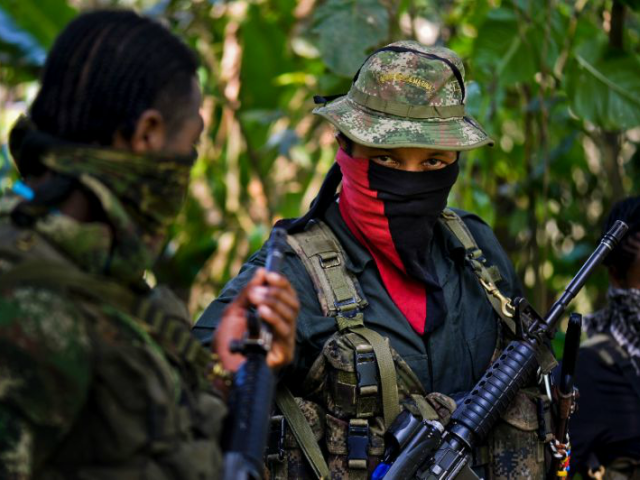The Marxist terrorist organization FARC—recently relaunched as a political party—has failed to meet the requirements of a peace deal signed in Cuba with the government of Colombia, the U.S. ambassador to that country asserted this week.
In a wide-ranging interview with the Colombian newspaper El Tiempo published Sunday, Ambassador Kevin Whitaker asserted that the Revolutionary Armed Forces of Colombia, which adopted the new name “Revolutionary Alternative Common Force” this month, has not been forthcoming regarding its assets and ties to drug trafficking, as required by the peace deal.
The Havana accord granted the FARC the ability to establish a political party and receive amnesty for most of its members in exchange for handing over its weapons and a full list of all its assets.
Whitaker accused the FARC of not aiding the Colombian government with drug trafficking investigations, not handing over a full list of its financial assets, and handing over a list of members requesting amnesty that included non-FARC members attempting to capitalize on the deal by faking FARC membership to end their prison sentences.
“The FARC has committed in the agreement to cooperating with the Colombian government, something that is not happening,” Whitaker said.
“The FARC has not complied, in my judgment, with its obligations based in the accord,” Whitaker said. “What does the accord say? It says the FARC need to give information regarding drug trafficking so that there can be investigations … something that has not happened.”
“The FARC, in our estimation, is making a major error in two senses,” Whitaker said, speaking on behalf of the Trump administration. “First, they have a legal obligation. The agreement is clear; it cannot be clearer. What is the principal political problem of the FARC? That the people do not trust them. And not complying with norms, particularly regarding drug trafficking, simply underlines the impression that the FARC really do not want to be involved in democratic institutionalization in Colombia.”
Regarding the terrorist group’s assets—which, in 2014, were surpassed only by Hamas and the Islamic State—Whitaker said that “without a doubt” the group had more money than they claimed.
“I’m sure there is more money in there,” he said. “For example: the FARC said that they have what they have and put together this Bolívar plaza ceremony [to announce their political party]. Who paid for that? That was a multi-million-dollar production.”
The FARC issued the government a list of assets this month that one high-ranking Colombian official described as “absolutely ridiculous” and “a joke,” which included items like mops and juice squeezers but few major properties or high-value items.
Whitaker also noted another major problem with the FARC peace deal: unrelated prisoners who are retroactively trying to claim membership in the FARC to have their crimes absolved. “We are investigating various cases right now of people who are trying, in a fraudulent manner, to be included on the [amnesty] list, even though they shouldn’t be there,” he noted. While he emphasized that those trying to aid the fraud would be held responsible, he did not provide a clear answer on whether this extended to FARC officials involved in the fraud.
According to Rodrigo Rivera, Colombia’s High Commissioner for Peace, at least 500 names provided to the government for potential amnesty belong to individuals who do not appear to have ties to the FARC.
Whitaker concluded that the United States cannot negotiate with the FARC, as it is a State Department-designated terrorist group, but that the Colombian government has made a “sovereign decision” to do so “and we fully respect it.”
Following the publication of the Whitaker interview, Rodrigo Londoño, the FARC leader known as “Timochenko,” published an “open letter” to Colombian President Juan Manuel Santos claiming that the government, not the FARC, have violated the deal.
“A true campaign of hatred and smearing is being lashed against us. The reconciliation we dreamed of is being stranded, pushed down by those committed to deny us a space in Colombia. It is as if the end of conflict and the building of a just and lasting peace had not been agreed. Therefore I wanted to raise a voice of alarm,” Timochenko alleged, according to leftist regional outlet Telesur.
The FARC’s half-century-old Marxist terror campaign has killed at least 220,000 people.

COMMENTS
Please let us know if you're having issues with commenting.